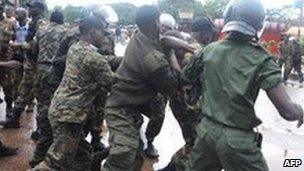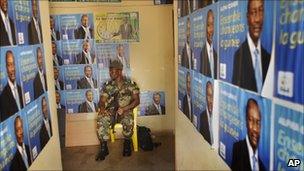Did Guinea democracy activists give their lives in vain?
- Published

The Conakry stadium massacre shocked the world
On 28 September 2009, soldiers of Guinea's Presidential Guard burst into a football stadium and opened fire with live ammunition on unarmed pro-democracy demonstrators.
They fired into the spectator stands; they shot people who were running away; an estimated 150 people were murdered.
They raped numerous women at the stadium and they detained others for rape later; they illegally arrested dozens of people and tortured them.
All this is according to numerous eyewitnesses I interviewed just a few weeks after the stadium massacre.
The memories were still raw and the wounds - on the thighs and stomachs of some of the women, and on the backs of some of the men - were still visible.
Waiting for justice
It was an event that was so shocking that Guinean pro-democracy activists thought it might prove to be a seminal event - a catalyst for change.

The presidential election run-off is due to be held on 10 October
Whether that happens will now be decided in the next few weeks. Under local and international pressure, elections are being held which activists say may be the democratic response to that terrible day last September.
But one year on, according to Human Rights Watch, external, "none of those responsible for the killings has been brought to trial".
There are several reasons for this but, according to the victims and their families, no excuses.
Guinea's history has been mainly undemocratic since independence from France in 1958 and, of course, before that, under colonial domination.
The army has ruled for many of those years and has grown into an unaccountable, bloated body of over 30,000 men - far more than is required in a country that faces no serious outside threats.
The death in 2008 of the longtime military leader Gen Lansana Conte gave opposition politicians a possible opening.
An army captain, Moussa Dadis Camara, seized power. But at first, at least, he promised he would not stand in elections.
Gradually, that promise was eroded and discipline in the army collapsed. Power bases developed in different military corps - even within different parts of the sprawling army headquarters in the capital Conakry.
Stadium stormed
Pro-democracy groups decided to press their case and on 28 September, 2009, they gathered in Conakry's main football stadium to denounce the presumed candidacy of Capt Camara, widely known as just "Dadis".
One man who was there said: "There were 50,000 people in the stadium shouting 'Freedom!' 'Freedom for the people of Guinea!'."
Some disputed the numbers attending, but few questioned what happened next.
Soldiers from the Presidential Guard and other military units entered the stadium and, without warning, opened fire.
"They hit me until I lost consciousness," said one woman survivor from the stadium. "I said: 'You can kill me but you cannot rape me'.
"An old man was there with his son. He told the soldiers to leave me alone. They slit his throat then they killed his son.
"I lost consciousness three times", the woman continued. "They were raping others around me. They raped my cousin with the muzzle of a rifle. Now I feel so bad, I just want to die."
The army imploded with accusations of responsibility for the massacre. A few weeks later there was a shootout between Dadis and one of his aides. Dadis took a bullet in the head and has been recovering in exile in Burkina Faso ever since.
Democratic hopes
Following local and international pressure, a first round of democratic elections took place in June. Two front-runners emerged - the long time opposition figure Alpha Conde and the smooth politician Cellou Dalein Diallo.
But cracks began appearing between the civilian politicians - who had been so united in the face of military dictatorship - as the prospect of real power beckoned.
There were accusations of vote rigging during the first round of polling. Election officials were sacked.
But there is still a chance that the events of that day last September could prove to be a force for democratic change.
The government that emerges from the second round of polling - now tentatively due on 10 October - is being urged by human rights groups to end the cycle of violence and impunity that created the conditions for massacres like the football stadium killings.
Corinne Dufka of Human Rights Watch, one of the first foreign researchers to investigate the massacre in detail, said that ensuring those responsible for the 2009 violence were put behind bars would be "a very good place to start".
It is a statement many Guinean civilians would agree with.
But the reaction of the men with guns - the 30,000-strong army - may, in the short term at least, be more important.
- Published25 June 2010